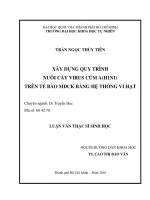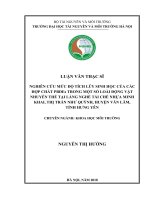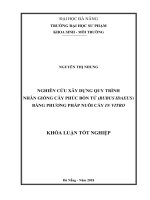Nghiên cứu xây dựng quy trình nuôi cấy quả thể đông trùng hạ thảo (Cordyceps Militaris) và bào chế viên nang mềm sâm Ngọc Linh - Đông trùng hạ thảo
Bạn đang xem bản rút gọn của tài liệu. Xem và tải ngay bản đầy đủ của tài liệu tại đây (1.03 MB, 2 trang )
<span class='text_page_counter'>(1)</span><div class='page_container' data-page=1>
<b>NGHIỆN CỨU XÂY DỰNG QUY TRÌNH NUÔI CẤY QUẢ THẺ </b>
<i><b>ĐÔNG TRÙNG HẠ THẢO {CORDYCEPS MIUTARIS) VÀ BÀO CHÉ </b></i>
<b>VIÊN NANG MỀM SÂM NGỌC LINH - ĐÔNG TRÙNG HẠ THẢO</b>
Đặng Trường Giang, Bùi Thị Thu Hà, T riệu Bạch Liên, Vũ Tuấn Anh
<i>Học viện Quân y</i>
<b>1. ĐẶT VÁN ĐỀ VÀ MỤC TIÊU NGHIÊN cứ u</b>
Đông trùng hạ thảo là dược liệu quý hiếm có nhiều
tác dụng sinh học. Trên thực tế chưa cung cấp đù cho
nhu cầu thị trương rất lớn hiện nay. Việc kết hợp sâm
Ngọc Linh sinh khối và ĐTHT trong cùng một sản
phẩm thỉ chưa có tại thị trường Việỉ Nam. Mục ỉiêu:
<i>xây dựng qui trình ni cấy quà thể c.militaris và bào </i>
chế viên nang mềm SNL-ĐTHT.
<b>2. ĐỐI TƯỢNG, PHƯƠNG PHÁP NGHIÊN cứ u</b>
* Đôi tượng: Cao khô sâm Ngọc Linh SK; Chủng
<i>c.militaris (Fries) Link (NBRC9787) và các hóa chất </i>
đạt íiêu chuẩn phân tích, bào chế.
* Nghiên cứu xây dựng qui trình ni cấy quả
<i>thể c.m ílitaris: Nuôi cấy trên môi trường (MT) </i>
MYPS(+casein) và PDA(+pepton), đánh giá lựa chọn
bằng cảm quan. Nuôi cấy trên 05 MT lỏng (casein 10g,
peptone 8g, cao nấm men 5g), chì khác từ CTL1 đen
CTL5 thêm 2g lần lượt là succrose, maiiose, glucose,
fructose, lactose, c ấ y hệ sợi vào bình và lắc với tốc
độ 90 vòng/phút; thu hệ sợi ờ các ngày thứ
2,4,6,8,10,12 đánh giá tỷ lệ tăng trường. Nuôi cấy trên
giá thể nhân íạo: GT1 đến GT5, theo quy trình của
Wen (2012), thu hoạch vào các ngày íhứ 20,40,60,70
đánh giá BE%, hàm iượng Adenosine và Cordycepin.
<i>Sấy khơ quả thể c.militarís bằng: sấy tĩnh ơ 60°c </i>
(PP1); sấy bằng vi sóng (4Ũ°C, ấp suất giảm) (PP2);
sẩy đông khô (-10°C) (PP3). ,
_ <b>Nghiên cứu bào chế viên nang mềm SNL- </b>
ĐTHT: Công thức: Dược chất (Cao kho sâm NLSK,
bột ĐTHT, vitamin, khoáng chất); Tá dược (Lecithin,
Tween 80, Sáp ong írắng, dầu cọ, dầu đậu nành); v ỏ
nang (Gelatin, Glycerin, Sorbitol 70%, Nipagin,
Nipasol, Ethyl vanilin, Titan dioxid, màu socola, nước
cất). Tính tỷ lệ % tao hỗn dịch sau 72 giờ.
3. KÉT QÙẢ VÀ PHÁT HIỆN CHÍNH
* Kết quả xây dựng q u i trình ni cấy quả thể
<i>c .m ilita ris : Chuẩn bị: MYPS+casein: agar 20g, </i>
peptone 6g, Cao nấm men 4g, glucose 4g, casein 10g.
CTL1 (pH=6): casein 10g, succrose 2g, peptone 8g,
cao nấm men 5g, nước cat vđ 01 lit. GT5: Cơm 40%,
Nước dừa 55%, Bột nhộng tằm 5%, Casein 5%. Tiến
hành phân lập từ chủng NBRC9787 trên
MYPS+casein ở điều kiện 23-25°C, 80-85%, trong 20
ngày, c ấ y chuyển hệ sợi sang CTL1 và iắc với tốc độ
90 vòng/phút trong 7-9 ngày, c ấ y chuyển hệ sợi sang
GT5 (0,1g hệ sợi/10g giá thể). Nuôi ở điều kiện tối,
nhiệt độ 20°c trong 07 ngày. Sau đó nuôi ở nhiệt độ
25°c vởi chu kỳ sáng/tối ỉa 14/10, cường độ sáng 50Ò
iux, độ ẩm 85±5% trong 60 ngay, sấy khô qua thể
bằng sóng viba (dưới áp suất giảm) ờ 40°c, sau đó
nghỉen thành bột mịn.
* Kết quả nghiên cứu bào chế viên nang mềm
SNL-ĐTHT: Dược chất (cao khô sâm NLSK 200mg;
bột ĐTHT 100mg; vitamin
A/E/Bi/Bg/Bs/Be/PP-0,3mg/15mg/01mg/ 03mg/01mg/01mg/10mg, kẽm
1,25mg; selen 0,01 mg); Tá dược (Lecithin 36,5mg;
Tvveenèo 25mg; Sáp ong trắng 36,5mg; dầu cọ 73mg;
dầu đậu nành vđ 730mg); v ỏ nang (gelatin 500mg;
glycerin 140mg; sorbitol 70% 180mg; ethyi vanilin
1,2mg; titan díoxid 4,8mg; màu socola 3,4mg; nước
cat 375mg; nipagin Ó,84mg; nipasol 0,216mg). Tién
hành bào chế theo phương pháp ép khuôn. Qui trinh
đã được đánh giá đọ ổn định.
4. KẾT LUẬN VẢ KIẾN NGHỊ
Đã xây dựng được qui trình nuôi cấy quả thể
<i>c.militaris và qui trình bào chế viên nang mềm SNL- </i>
ĐTHT ỉheo phương pháp ép khuôn. Sản phẩm viên
nang mềm SNL-ĐTHT đã được Cục An toàn Thực
phẩm/BỘ Y íế cấp phép lưu hành toàn quốc số
1125/2015/ATTP-XNCB và Công ty TNHH TM&DV
Phươnci Linh phân phối độc quyền. Tiếp tục mở rộng
<i>nâng cap qui mơ nuồí cấy qua thể c.militarìs tại Học </i>
viện Quan y. Tiến tới cung cẩp ra thị trường dạng quả
thề khô.
STUDY ON CORDYCEPS <i>( C O R D Y C E P S</i> MILiTARIS)
FRUITING-BODY CULTURE PROCEDURE AND
MANUFACTURING SAM NGOC LINH - DONG TRUNG HA
THAO SOFT CAPSULE
Dang Truong Giang, Bui Thi Thu Ha, Trieu Bach
Lien, Vu Tuan Anh (Vietnam Millitary Medical
University)
1. BACKGROUND
Cordyceps is a precious medicinal herb and it has
many biological effects. The production in Vietnam
actually does not provide enough for the huge market
demand. The combination of Ngoe Linh ginseng
biomass with Cordyceps in the product is wasn t found
in Vietnam. Purposes: Constructing the processes of
culturing Cordyceps and manufacturing SNL-ĐTHT
soft capsule.
2. MATERIALS AND METHODS
<i>* M aterials: Ngoe Linh ginseng biomass powder;</i>
<i>c.militaris (Fries) Link (NBRC9787) and standard </i>
chemical, excipients.
<i>* Researching to c o n s tru c t the pro ce ss o f </i>
<i>cu ltu rin g fru itin g -b o d y c .m ilita ris : Culturing in the </i>
MYPS(+casein) and PDA(+peptone). Observing the
development of mycelium. Subculturing in liquid media
(ingredients: 10g casein, 8g peptone, 5g yeast extract,
add 2g ío CTL1 to CTL5 succrose, maltose, glucose,
fructose, lactose, respectively). Culturing the mycelium
in the conical and shake With a rate of 90 rounds/min;
harvesting the mycelium after 2,4,6,8,10,12 days,
evaluation based on growth rates. Subculturing on
artificial substrates: according to the process of Wen
eỉ.al (2012), after 20,40,60,70 days was harvested,
</div>
<span class='text_page_counter'>(2)</span><div class='page_container' data-page=2>
-evaluated BE%, adenosine and cordycepin content.
Drying fruiting-body Cordyceps: drying at 60°c (PP1);
drying (at 40°c, reduced pressure) by microwave
(PP2); drying by freeze-drying at -10°c (PP3).
<i>* Researching m anufacture SNL-ĐTHT s o ft </i>
<i>capsule: Formula: active ingredients (Ngoc iinh </i>
ginseng biomass powder, Cordyceps powder,
vitamines, minerals); Excipients (Lecithine, Tween 80,
white beeswax, palm oil, soybean oil); Soft capsule
cover (Gelatin, Glycerin, Sorbitol 70%, Nipagin,
Nỉpasoỉ, Ethyl vaniliine, titanium dioxide, color
chocolate, distilled water). Evaluating a percentage
was suspended after 72 hours.
3. RESULTS
* C onstructiving the process o f culturing
<i>fruiting-bod y c .m ilita ris : Prepare: MYPS + casein: </i>
20g agar, 6g peptone, 4g yeast extract, 4g glucose,
10g casein. CTL1 (pH = 6): 10g casein, 2g succrose,
8g peptone, 5g yeast extract, water to 01 liters. GT5:
40% Rice, 55% coconut water, 5% silkworm pupae
powder, 5% Casein. Procedure: Proceed isolated from
strains NBRC9787 on MYPS+casein at conditions 23-
25°c, 80-85%, for 20 days. Subculture to CTL1
medium and shake at rates of 90 rounds/minute,
culturing for 8 days. Subculture myceiium to GT5 (0,1g
mycelium/1 Og substrates). Culturing in the dark, at
temperature of 20oC for 07 days. Then culturing at
2 5°c with the lighưdark is 14/10, intensity light 500 lux,
humidity 85 ± 5% for 60 days. Drying fruiting-body by
microwave (under reduced pressure) at <b>40°c, </b>then
ground to the powder.
* M anufacturing <b>SNL-ĐTHT </b>s o ft capsule: The
active ingredients (200mg Ngoe Linh ginseng biomass
power, 100mg Cordyceps powder; respectively
O^mg/lõmg/Olma/OSma/Olma/Olma/IOma - vitamine
A/E/B1/B5/B2/B6/PP, 1,25mg zinc; 0,01 mg selenium);
Excipients (36,5mg Lecithine; 25mg Tween80; 36,5mg
white beeswax, 73mg palm oil, soybean oil to 730mg);
Soft capsules cover(500mg gelatin, 140 mg giycerin;
180mg sorbitol 70%; 1,2mg ethyl vaniliine; 4,8mg
titanium dioxide; 3,4mg chocolate color; 375mg
distilled water; 0,84mg nipagin; 0,216mg nipasol).
Manufacturing by the molding method. The process
was evaluated stability.
4. CONCLUSIONS
Constructing the processes of culturing fruiting-
body c.militaris and the process of manufacturing
SNL-ĐTHT soft capsule by molding method. This
product has been licensed by VFA (Vietnam Food
Administration) with No. 1125/2015/ATTP-XNCB and
lias been exclusive distributed by Phuong Linh
Trading&Service Co.,Ltd. Continuing to expand the
scale of culturing fruiting-body c.militaris at the
Vietnam Military Medical University. Providing dried
fruiting-body for market demand in the future.
<b>Bư ớc </b>
<b>ĐÀU NGHIỆN </b>
<b>cứ u </b>
<b>XÂY DỰNG CÔNG THỨC </b>
<i><b>DUNG DỊCH NHỎ MẮT NATRI DICLOFENAC IN SITU GEL</b></i>
ĐỖ Thị Kim O anh1, Vũ Thị Thu Giang2*
<i><b>1 Trường Đại học K ỹ thuật Y tế Hải Dương </b></i>
<i><b>2Trường Đai hoc Dươc Hà Nỗi</b></i>
TÓM TẮT
<i>Nghiên cứu xây dựng công thức bào chế dung dịch nhỏ mắt natrí diclofenac in situ gel nhạy nhiệt sừ dụng </i>
<i>polyme tạo gel là Piuronic F 127. Phương phốp bào chế phuưng pháp lạnh (cold method) và đánh giả một số đặc </i>
<i>tính tạo gel như khả năng chày, nhiệt độ tạo gel, khả năng tạo gel va đạc tính lưu biến của gel. Tính chắt của gel </i>
<i>ảnh hưởng bởi thành phản công thức xây dựng như tăng F 127 làm giảm nhiệt độ tạo gel, tăng F68 làm tăng </i>
<i>nhiệt tạo gel. Trong nghiên cứu này Carbopol không ảnh hưởng đến nhiệt độ tạo gel nhưng ảnh hưởng đến khả </i>
<i>năng kết dính sinh học, khà năng giải phóng dược chất, pH cùa sản phầm. Dung dịch nhỏ mắt natrí diclofenac in </i>
<i>situ gel được lựa chọn có nhiệt độ tạo gel thích hợp khi nhỏ mắt là 34,5 ±0,2°c.</i>
<i><b>Từ khóa: natrì diclofenac in situ gel</b></i>
SUMMARY
<i>This work was conducted to evaluate Pluronic F127-based thermoresponsive diclofenac sodium ophthalmic in </i>
<i>situ gels (DS in situ gel). They were prepared by cold method and investigated their physicochemical properties</i>
<i>i.e. flow ability, sol-gel transition temperature, gelling capacity and rheological properties. It was found that </i>
<i>physicochemical properties o f DS in situ gels were affected by formulation compositions. Increment o f Pluronic </i>
<i>F127 content decreased sol-gel transition temperature o f the products while increase in Pluronic F68 </i>
<i>concentration tended to increase sol-gel transition temperature. In this study, Carbopol 934 did not affect sol-gei </i>
<i>transition temperature but it affected transparency, pH, and gelling capacity o f the products. The final formulation </i>
<i>exhibited sol-gel transition at 34.5 ± 0.2ŨC with DS in situ gel had potential as an alternative to the conventional </i>
<i>diclofenac sodium eye drop.</i>
<i><b>Keywords: Diclofenac sodium ophthalmic in situ gels.</b></i>
ĐẠT VÁN ĐỀ các bệnh về mắt với nhiều ưu đềm so với thuốc chổng
</div>
<!--links-->









